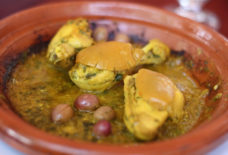Standing Rock Victory Felt by Arab Americans and Palestine
A woman holds a branch of cedar during a prayer ceremony on Backwater Bridge during a protest against plans to pass the Dakota Access pipeline near the Standing Rock Indian Reservation, near Cannon Ball, North Dakota, U.S. November 27, 2016. REUTERS/Stephanie KeithBY: Adriana Murray/Contributing Writer
Over the last several months, the fight to stop the Dakota Access Pipeline (DAPL) has been consuming the hearts of activists around the world. After eight months of protesting, the U.S. Army Corps of Engineers finally blocked the pipeline from running through a Native American reservation, giving a win to America’s native population.
The DAPL project, which was a proposed 1,172 mile long underground pipeline, was first introduced in 2014 in order to pump 450,000 barrels of crude oil a day out of North Dakota. In July, the Standing Rock Sioux tribe filed a lawsuit in the federal district court in Washington, D.C. against the pipeline project because it ran through sacred Native American grounds and would have a detrimental impact on local water.
In September, the court denied the tribe’s request for a preliminary injunction, sparking attention and outrage nationwide. Despite rejection from the federal district court, the U.S. Army Corp of Engineers decided to stop any future permits, but the Energy Transfers project continued with the pipeline plans anyway.
Since mainstream media was not covering the DAPL controversy for nearly two years, the issue became a talking point on social media. Tweets, Instagram posts, and Facebook videos of the protests propelled Standing Rock into an important, national conversation about the statuses of corporations and Native Americans in this country. Those who opposed the pipeline cited corporate greed and remorseless destruction as reasons to stand with Standing Rock. As the number of protesters at Standing Rock grew, so did the intensity of the police’s reaction. Many protesters were hosed with cold water and shot at with rubber bullets by the authorities sent to “protect” the DAPL company, not the citizens.
Strength and resilience demonstrated by the indigenous tribes inspired people across the country to stand in solidarity with the protesters. Similar to the Students for Justice in Palestine and Black Lives Matter movements, the Standing Rock Reservation protests serve as a reminder that it is important to never stop fighting against injustice, no matter the obstacle. As Desmond Tutu once stated, “If you are neutral in situations of injustice, you have chosen the side of the oppressor.”
Israel has stolen most of Palestine & steals most of its water. Sound familiar? These Palestinians say #IStandWithStandingRock. @NoDAPL! pic.twitter.com/OjKcaStDar
— Oxford PSC (@OxfordPSC) November 7, 2016
Among those that avidly supported the efforts of the indigenous groups were Palestinians from the West Bank and Gaza, Arab Americans, and members of Black Lives Matter. Many Arab Americans, Palestinians, and Black Americans took to social media and other methods of communication, such as writing open letters, to express solidarity.
In one of the many letters written to the Sioux tribe, one Palestinian wrote:
“Although we are of different color, religion, culture and place, I have learned, as I read about the protests at Standing Rock, that we have much more in common than differences. When I read your history, I can see myself and my people reflected in yours. I feel in my core that your fight is my fight, and that I am not alone in the battle against injustice”
Black Lives Matter activists organized multiple trips to the Standing Rock Reservation and held several fundraisers to collect supplies to be sent to the protesters. Other activists within the African American community held local protests in New York, where they held speeches and chanted, “water is life.”
Welal’in #BLM Black Lives Matter for standing in solidarity w #StandingRock to protect water. #waterislife #NoDAPL pic.twitter.com/LmAO5tDkSG
— Pam Palmater (@Pam_Palmater) September 4, 2016
Arab Americans also played an indispensable role in standing with the protesters in their fight. Groups within the community collected donations to purchase food and medical supplies for the protesters. Many Arab American organizations sponsored people to attend the protests and increase ground support in the fight against the project.
Prominent Arab American activist Linda Sarsour attended the protests.
.@OurRevolution @sunstretch @billmckibben #StandingRock = like #Palestine every day. Blessings 2 @LSarsour #PalestinianAmerican at #NoDAPL! pic.twitter.com/4BECIJN37v
— #NoJusticeNoPeace (@PalsJustice) November 25, 2016
After President Obama announced on Sunday that the DAPL project would be rerouted, many news outlets praised him for the decision. However, the real praise should go to the protesters who withstood months of rough conditions to protect their land without support from the government. The indigenous people and their supporters endured months filled with adversity and spirit-diminishing opposition, but never allowed the obstacles to discourage them and end their efforts.
The #noDAPL movement shows how unity among oppressed people can ignite a passion that cannot be ignored. This passion indicates that the power to overcome oppression and induce positive change lies in the hands of those that can see past their differences and realize that an injustice against one is an injustice against all.



